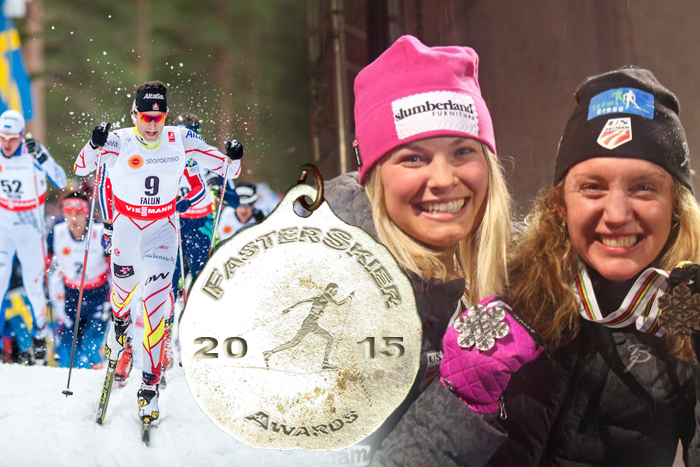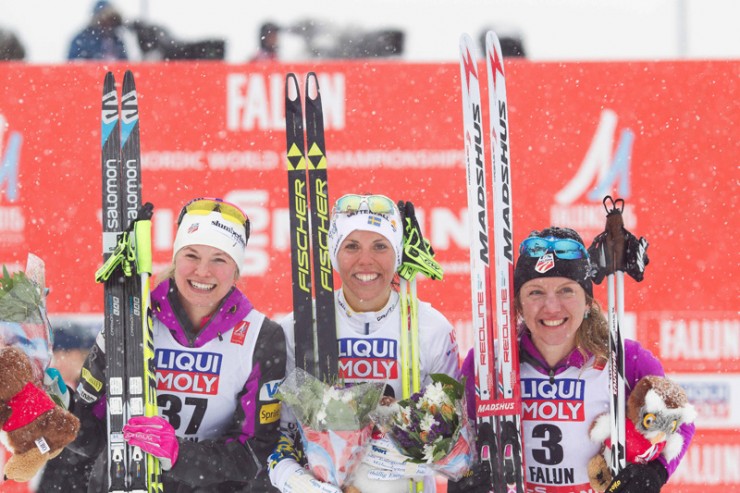
With the 2014/2015 season officially in the rearview, FasterSkier is excited to unveil its annual award winners for this past winter. Votes stem from the FS staff, scattered across the U.S. and Canada, and while not scientific, they are intended to reflect a broader sense of the season in review.
***
Jessie Diggins and Caitlin Gregg, 2015 World Championships 10 k freestyle individual start
It’s rare for American cross country skiers to earn World Championships medals. Before this winter the U.S. had only stood upon the podium four times over the history of the sport – Bill Koch in the 1982 30 k, Kikkan Randall in the 2009 sprint, and Randall and Jessie Diggins in the 2013 team sprint.
Come February of 2015 the count increased to six because of pair of midwestern skiers, Diggins and Caitlin Gregg, who surprised nordic fans across the globe with their 2-3 finish in the World Championships 10 k freestyle individual start.
The day was far from ordinary as light flurries turned to a dumping of wet snow that slowed the trails in Falun, Sweden for the competition’s late starters. Gregg, in bib 3, missed the majority of the heavy snow but skated over the two-lap course with confidence and control to cross the line with the leading time. Her stay in the leader’s chair lasted longer than expected, as skier after skier failed to match her effort. It was only until Diggins entered the finish that Gregg lost her spot in on the hallowed seat.
When the whirlwind day — filled with blowing snow, tears and cheers — was complete, Diggins and Gregg placed second and third, respectively, behind home-crowd favorite Charlotte Kalla of Sweden. Kalla’s time of 25:08.8 outpaced Diggins by 41.0 seconds and Gregg by 46.9.

The historic performances – which were the best distance results of an American women at a championships event – were a product of a combination of efforts, from coaching to a phenomenal wax team, and the two Americans took advantage of the opportunity that was handed to them. The night before the 10 k freestyle U.S. Ski Team women’s coach Matt Whitcomb gathered the team for a pep talk. According to Diggins and Gregg, the theme of his speech revolved around the simple question: Why not?
He emphasized that many skiers count themselves out before they’ve even had the chance and that every member of the U.S. team had the opportunity to achieve their best. The two skiers didn’t know it at the time, but Whitcomb’s central message — anything is possible –– would become a reality the next day.
Taking Whitcomb’s advice, both athletes entered the 10 k with high expectations. Diggins, a regular on the World Cup circuit, explained her goal was a top six: “If I was having an amazing day,” she said.
Gregg, on the other hand, skied with the aim of being an early leader. She easily accomplished her objective, but soon realized that her time was much better than she ever could have expected.
“My goal was to try to come in, be the leader, and put in a good time,” she said. “I think it took maybe another twenty or thirty skiers before I started realizing that it was actually a really, really good time.”
Gregg watched Diggins from the leader’s chair as the 23 year old trailed on the final climb and then roared into the finish to best Gregg by nearly six seconds. “Then all of a sudden things started to become a reality,” she said.
The silver was Diggins’ second-career World Championships medal. Her first came from the 2013 freestyle team sprint in Val di Fiemme, Italy, where she joined forces with Kikkan Randall to claim gold. The pair was the first to earn a World Championships title in the history of U.S. skiing.
Gregg hasn’t been at, or near, the top of international skiing since the start of her career. The 34-year-old’s best World Cup result was in a 2010 Canmore World Cup, where she place 14th in the 10 k freestyle. Her next best result was last year in Falun at the 2014 World Cup Finals where she had the 25th fastest time in the 10 k pursuit. Last season, Gregg missed a spot on the Olympic team despite dominating the domestic distance circuit.
As the 2014 SuperTour leader, Gregg started the 2014/2015 season on the World Cup, but contracted shingles and consistently race in the 50s on the World Cup.
Due to USSA criteria and the previous year’s Olympic selections, it appeared uncertain whether or not Gregg would be named to the U.S. World Championships team. Come Jan. 26, however, Gregg’s name was on the list and she was preparing conquer the 10 k freestyle — a race she had been focusing on all year.
According to Gregg, her bronze medal was validation of a career that has consisted of hard work and perseverance. She said her medal sent a clear message that developing skiers who aren’t often given the best opportunities from the start of their careers can still be successful — all it takes is a little passion and grit.
“If you really truly feel it in your heart, keep pushing, keep pushing,” she said. “Anything is possible. Obviously, a lot of things fell together today for me, but I think it is a super strong message.”
“Some skiers just take a little bit longer to get going,” she added with a laugh. “You can win your medal at 34 years old.”
Both Diggins and Gregg will return to the U.S. Ski Team to compete on the World Cup in the 2015/2016 season.
Alex Harvey, 2015 World Championships
When it came time to pick the male cross country performance of the year choosing the recipient was an easy decision. Alex Harvey was the leading North American man of the year and gave many inspiring displays of athleticism over the course of the winter.
Then the hard part came: choosing his best performance.
Over the course of the regular season, Harvey skied to earn ninth overall on the World Cup ranking list, but it was at the World Championships where the 26-year-old truly shined. His collective results from the year’s most important two weeks of racing warranted an award for not just a single race, but for multiple performances.
It all began at the first race of World Championships: the classic sprint. Harvey started the day qualifying in fifth position. He continued to advance through the heats – but not without some close calls. From the quarterfinal to the final, Harvey would ski at or near the back of the pack, at times would seem as if he was out of the running. By the finish, however, he would always be positioned at the front.
In the final Harvey sat in fourth on the last hill before charging into the line. He finished second only to Norway’s Petter Northug.
Canadian National Team Head Coach Justin Wadsworth said he believed Harvey could have overcome Northug, had the finishing straightaway been longer.
“I think if it would have been five more meters, he would have won the race,” Wadsworth said in a post-race interview. “[Harvey] said ‘oh i timed it kind of bad,’ but I think it was an amazing race, especially after being in last place at the top of the hill.”

Harvey reflected a similar sentiment, saying that he was gaining on Northug as they approached the finish. However, the Canadian was cautious in his speculation, adding, “I wouldn’t redo the race just to take that chance.”
When asked how he was able to advance from dead-last to a podium position, Harvey explained that his come-from-behind day wasn’t necessarily planned.
“I would like to lead on this course on the first hill if I could. [The course] is a bit more endurance-based and I am a bit more of an endurance-based athlete.” he said.
Despite trailing the pack at the key point in the race, Harvey explained the first hill was more of a “warmup” and the second hill was where he needed to make his move. The Canadian added that he was confident in his skiing despite his position, because he knew his finishing speed was strong.
Wadsworth agreed, adding that fast skis also played a large role in Harvey’s performance.
“I think he knows what he’s capable of and he knew the skis were good enough to do that,” he said. “This course has such a fast downhill. Then all you have to do is run up that and everyone is going to run the same. Then you have to have enough speed for the end and his double poling has been really good.”
The silver medal marked Harvey’s highest individual placement at a World Championships. Prior to the sprint, the Canadian had won two other medals. In 2011 he and Devon Kershaw powered to a World Championship title in the team sprint and in 2013 he claimed third in the classic sprint.
There was more to come from Harvey as the championships progressed.
Two days after his silver medal performance, Harvey competed in the 30 k skiathlon. He stayed near the front of the race, often switching the lead with the event’s favorites – eventual winner Maxim Vylegzahanin, Dario Cologna, and Maurice Manificat among others.
As the finish approached, Harvey sat nearly seven seconds behind Vylegzahanin, Cologna, and Didrik Tønseth. He charged hard to close the gap, and nearly caught them on the second-to-last climb. While Cologna and Vylegzhanin skied out of reach, Harvey trailed Tønseth closely, passing him 5 seconds before the finish.
“It was so mushy and I was starting to not see clearly,” Harvey recalled, noting that his legs felt extremely spent after 15 k of classic followed by 15 k of skating on Falun’s notoriously tough course — and in soft conditions on an above-freezing afternoon. “I knew my legs were not 100 percent, so I wouldn’t have an amazing sprint, but it was good enough to grab one place, that was good for the podium.
“I had two medals in my career in World Championships, and now I have two in three days,” he added after achieving his fourth medal. “It’s crazy.”
Wadsworth noted the impact the results had on the program after Canada took home one medal between the last two previous championships (2013 World Championships and the 2014 Olympics).
“To have two medals [in Falun], it’s more [about] showing that we do have one of the best programs for waxing and we’ve invested a lot in it,” he said. “We’ve also done things that are a little bit different than other teams or the U.S. by having a little bit smaller team. We’re here to get medals and this is what’s going to help our program in the long run, where we can put it back into development and other things. We have to go for it at these big events like this.”
Harvey continued a successful Championships with earning the fastest first leg time in the men’s 4 x 10 k relay in which Canada eventually placed 10th. Harvey skied to fifth in the 50 k classic mass start after leading for much of the race to close out the two weeks of racing.
Harvey will once again return to competition in the 2015/2016 season as Canada’s leading man. He began his spring training May 1, after dual surgeries on his iliac arteries. Armed with new hardware, the 26-year-old will look to add another successful year to his name.
***
Other 2015 FS Awards: Junior | Collegiate | Nordic Combined | Biathlon | Para Nordic | Breakthrough | Coach | Continental



